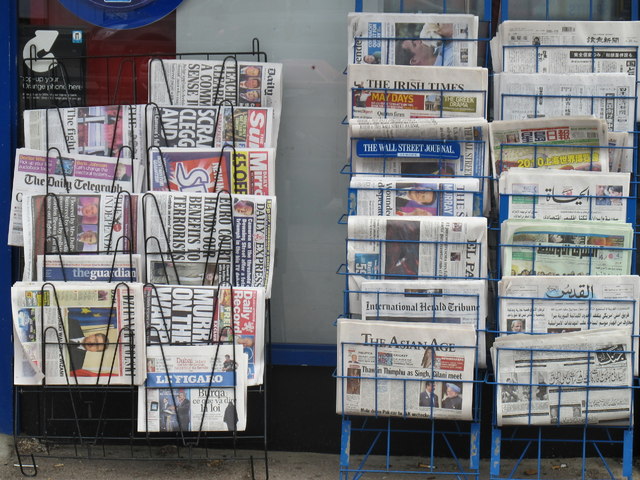
Mired in groupthink and shamelessly unrepresentative of the wider population, pundits, reporters and presenters in the mainstream media have proved unable to provide the journalism we need. After the Labour party’s surprise success in the 2017 general election and then the Grenfell Tower fire shortly after – a tragedy which could have been prevented had the media listened to the numerous whistleblowers – media personalities displayed a brief moment of introspection. But over the last few months the British media establishment have shown a renewed bullishness. We need a media that speaks for more than just the interests of a nepotistic establishment, and that can only be a media that is independent, democratically owned and properly accountable.
On Thursday 19 April, left-wing Guardian columnist Owen Jones dared to retweet a thread by Private Eye journalist Solomon Hughes drawing attention to Labour MP Angela Smith’s close links to major water companies. Hughes’ tweets came in response to an article Smith had written for The Times earlier that day, which attacked the Labour party’s policy of water industry nationalisation, despite huge popular support for nationalisation (polling at 83%). Jones was subsequently called out by a band of Conservative and right-wing Labour MPs, and their friends and allies in the media, for supposedly orchestrating an abusive pile-on on Smith. This sinister attempt to spin scrutiny of the public actions of a figure in public office as abuse represents yet another attempt by influential figures in the political and media establishment to delegitimize criticism of politicians and the media by left-wingers.
Jones has argued that the last few months have shown the return of suffocating groupthink among the media establishment highlighting “a massive disconnect between where the media is and the political reality of this country. But rather than attempting to bridge that gap, the media is doubling down, and treating the left as barbarians at the gate who have to be kept out at all costs.” As if to prove his point, Jones’s post was jumped on by more than 20 senior media figures, closing ranks to defend the culture of the UK press, with several asserting their comprehensive school education and working class backgrounds as definitive proof that no such disconnect could exist.
The government’s Social Mobility Commission reported in 2014 that 43% of newspaper columnists are privately educated, while only 23% went to comprehensive schools. Although privately educated journalists are not a majority, this represents a massive disparity with the wider population: 7% of the UK population attend private schools and 90% are educated at comprehensives. This disparity reflects a range of factors from explicit nepotism to unpaid internships and expensive training courses that exclude working class people from even getting a foot in the door. Even after getting onto internship schemes it can be difficult to land a full-time journalistic job and freelance journalists are typically poorly remunerated for their work. Working class journalists face not just barriers to entry, but a series of barricades. And this trend is only exacerbated in the higher echelons of the media: according to the Sutton Trust, 51% of the top 100 journalists were privately educated, while just 19% went to comprehensive schools.
This lack of diversity in the media creates dangerous blindspots: former BBC researcher Sarah O’Connell revealed on The Media Democracy podcast that in her time at the BBC she was one of the only journalists in the organisation who had regular contact with people living in council housing. It is no wonder our media often fails to register issues affecting working class people before they develop into disasters. But a lack of diversity in the media class also inevitably fuels political bias, as the profession is dominated by a nepotistic clique who were educated together and share close networks. Alex Nunns has charted precisely the dominance of right-wing voices on major shows on British broadcast media.
The recent twitter storm around Owen Jones is one episode among many that shows the British media establishment has regained their bullish self-confidence and disdain for perspectives outside of a narrow range of opinion. Media bias goes further than just a weighting of media opinion in a direction unrepresentative of the wider population: on the occasions when they are not outright excluded, anti-establishment voices are routinely delegitimised and attacked by other media figures. The Times has led the way in this hostility, with one recent headline attacking academics critical of the Conservative government decision to take part in a US-led missile strike on Syria without the necessary parliamentary approval as “Assad apologists”. Similarly, politicians who have argued against the government’s foreign policy positions – which the media establishment is largely sympathetic towards – have been monstered as foreign agents, saboteurs, and traitors.
Following the 2017 general election, there was a brief moment of self-examination amongst the media establishment, who had failed to predict Jeremy Corbyn’s Labour party would achieve such a strong result. A number of establishment figures questioned if they were out of touch with the population. Now such delicate considerations are out of the question: an assertive and bullying establishment media is back in full force. Ending suffocating groupthink, cultish loyalties and nepotistic networks in our media, will require serious reforms and structural changes to how the media operates. To make that possible we need democratic ownership and control of media institutions to ensure they represent the interests of the many, not merely those of a small and out of touch media elite and the four billionaires who fund them.